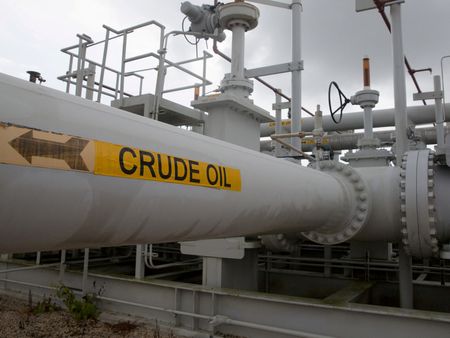 1
1 1
1

By Sonali Paul
MELBOURNE/BEIJING (Reuters) -Oil prices drifted lower on Friday and were set to drop around 3% for the week as consuming countries’ planned release of 240 million barrels from emergency stocks offset some concerns over reduced supplies from Russia due to western sanctions.
Brent crude futures edged lower by 55 cents, or 0.6% to $100.03 a barrel at 0403 GMT after gaining more than $1 in the early morning.
U.S. West Texas Intermediate (WTI) crude futures lost 34 cents, or 0.4%, to $95.67 a barrel.
Analysts said the emergency oil release, amounting to about 1 million barrels per day from May to the end of the year, might cap price rises in the short term, but would not fully cover volumes lost if more countries impose sanctions against Russia over its invasion of Ukraine, which Moscow calls a “special operation”.
“Although this is the biggest release since the stockpile was created in 1980, it will fail to ultimately change the fundamentals in the oil market. It is likely to delay further increases in output from key producers,” ANZ Research analysts said in a note.
The release may deter producers, including the Organization of the Petroleum Exporting Countries (OPEC) and U.S. shale producers, from accelerating output increases even with oil prices around $100 a barrel, they said.
Investors are also assessing the fundamentals in the oil market amid uncertainties over slowing demand in China, where cities have been locked down due to the latest wave of coronavirus infections, and the loss of supplies from Russia.
“Only time can give a clear answer,” said analysts from Haitong Futures.
A think tank affiliated to China’s state-backed CNPC lowered its view on China’s second-quarter oil demand by 180,000 bpd from its previous estimate due to the lockdowns there.
At the same time, the European Union’s consideration of a ban on Russian oil, following its plan to embargo Russian coal, will limit any drop in oil prices in the near term.
“In the court of public opinion, pressure is mounting on Brussels to act, and if that pressure valve pops and the EU sanctions Russian oil, we could see Brent crude at $120 in a heartbeat,” Stephen Innes, managing director of SPI Asset Management, said in a note.
(Reporting by Sonali Paul in Melbourne and Muyu Xu in BeijingEditing by Shri Navaratnam & Simon Cameron-Moore)